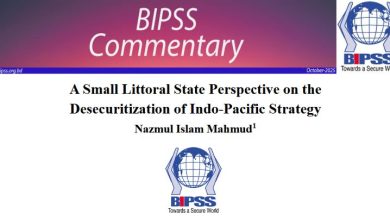
Redefining Security: Why Bangladesh Needs a National Non-Traditional Security Strategy
In the 21st century, security threats are no longer confined to military conflict or territorial breaches. For Bangladesh,a densely populated, climate-vulnerable, and geopolitically sensitive nation—the gravest challenges now emerge from non-traditional sources: climate change, pandemics, cyberattacks, forced migration, and disinformation. These cross-sectoral threats undermine national stability, economic resilience, and societal cohesion—yet remain insufficiently addressed by Bangladesh’s traditional, defense-heavy security framework.
In this commentary, BIPSS Research Assistant Saraf Wasima argues that Bangladesh urgently needs to institutionalize a National Non-Traditional Security Strategy (NNTSS) to realign its security architecture with contemporary threats. Such a strategy must encompass environmental resilience, public health systems, digital infrastructure, and human security frameworks. She underscores that current approaches—reactive, fragmented, and military-centric are misaligned with the realities of complex threats that transcend borders and bureaucratic silos.



